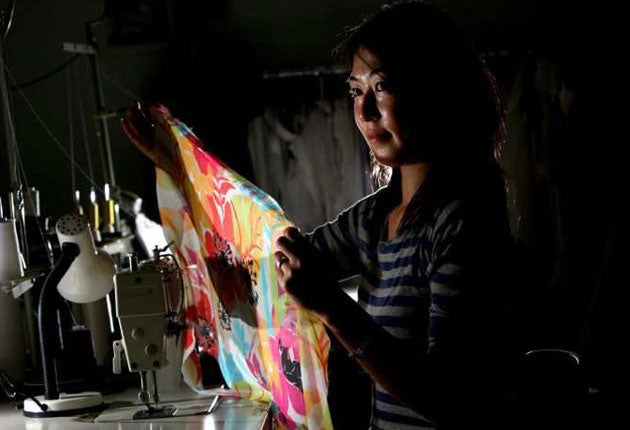Skills are out of fashion
The UK industry is falling behind as college graduates lack even basic tailoring ability.

Leading fashion designers have warned that Britain is in danger of falling behind its international rivals if the Government does not pump more money into the UK's fashion colleges. Style authorities including Jasper Conran, Mulberry and Savile Row tailors Henry Poole said that colleges were producing a worrying number of graduates who lack basic skills.
While British designers dominate the world's fashion houses, the skilled artisans needed to translate the designers' visions into reality are becoming scarce. More than 3,000 fashion students graduate from UK universities each year, yet only 500 can expect to get jobs in their chosen field, with designers claiming that they could employ more graduates if they had the requisite technical skills.
"As a luxury goods manufacturer, craftsmanship is what sets us apart from the high street," said Ian D Scott, supply director at Mulberry. "There used to be a big pool of skilled labour, which has gone now. We did some research a couple of years ago and found that 50 per cent of our workforce is over 50, which shows that there are fewer young people coming through."
So concerned are the designers that they are lobbying the Government, with the aim of drawing attention to what they call a "growing education crisis" in fashion.
"If graduates do not have pattern-cutting, computer-aided design and production skills, they can't put their creative ability to use in the industry," said Linda Florance, chief executive of Skillfast UK, the sector skills council for fashion and textiles.
The council has launched a Behind the Seams campaign, designed to draw attention to the craftsmanship behind the UK fashion industry. "We have heard from students who have paid up to £10,000 in course fees, yet have to pay again for private lessons, just to learn the basic skills that will make them employable," said Ms Florance.
British universities receive £80m each year to run fashion degree courses. New research conducted by the parliamentary monitoring bureau Dods, in connection with Skillfast, revealed that 51 per cent of MPs believe that a university's ability to equip students with the skills they need to get a job should be taken into account when deciding university funding.
The London tailor Imtaz Khaliq, who counts the Hollywood star Michelle Pfeiffer among her clients, teaches fashion graduates from colleges across the country. "I've got people coming to me who have graduated from fashion degree courses at prestigious places, and they can't cut a basic pattern," she said. "The colleges are underfunded and don't have the staff to teach simple skills." She added that students are having to pay out of their own pocket for pattern-cutting lessons.
While virtually all high-street retailers – and a fair share of designers – now outsource production to countries such as China and India, many labels would like to continue producing couture or hand-made pieces in the UK. But it takes hours of highly skilled labour: the feathers on Burberry's Prorsum dress, for example, are hand painted with gold brush strokes.
The need for skilled artisans extends beyond haute couture, however. "If you take a Mulberry Bayswater bag, there are three hours of craftsmanship in it," said Mr Scott. "You have someone sewing, another inking the seams, somebody riveting: these things are not made on a production line."
"I did a BTEC in tailoring at London College of Fashion," says Mai Cheetham, left. "As a foreign student I had to pay fees of £7,000 a year. We were supposed to be taught pattern-cutting, tailoring, how to make a basic three-piece suit, that sort of thing, but there were 30 or 40 of us in each class. I hadn't got any experience in tailoring, so I had to do a three-month work placement with a tailor when I finished to try to pick up the skills.
"It was really helpful. I learnt how to sew, to finish the garments, and lots of other things. I'm now working for a company that supplies Arcadia, the owner of stores such as Topshop and Dorothy Perkins. I've also had to have further training on the job to improve my skills."
Join our commenting forum
Join thought-provoking conversations, follow other Independent readers and see their replies
Comments
Bookmark popover
Removed from bookmarks